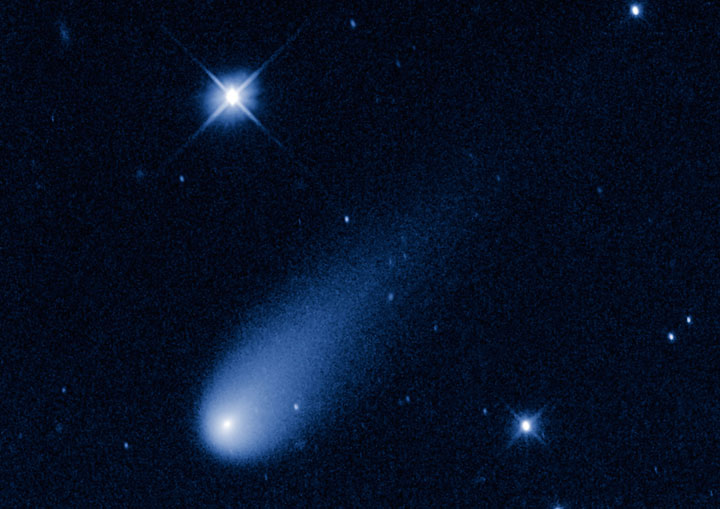Should a comet or large asteroid decide to head straight toward Earth, we’re pretty much out of luck.

We would needs years of preparation to combat such a strike, said NASA scientist Joseph Nuth, and as of now we are woefully unprepared.
“With a comet you don’t even know it exists, potentially, until you first detect it, and the time between detection and the potential impact is very, very short,” Joseph Nuth said, in an interview with Global News.
READ MORE: Dinosaurs likely killed by ‘one-two punch’ of volcanic eruption and asteroid collision
Asteroids are rocks, sometimes referred to as tiny planets, while comets are often called dirty snowballs — a mass of ice, rock and dust. There are about 15,000 such objects floating around the inner solar system.
WATCH: NASA launches rocket to explore asteroid orbiting sun

Asteroids aren’t very stealthy — scientists can usually detect a threat decades ahead of time. Comets are less likely to hit Earth, but they are much larger and more likely to be catastrophic.
Scientists would need about five years to prepare to deal with a comet, meanwhile, we might only get two years notice.
“We have to reduce the amount of time that we have to react to a comet appropriately.”
Interceptor or propellers?
There are options being touted to deflect an impact, and yes, they sound straight out of a movie.
We should be spending the time and money now to build an interceptor and put it into storage, Nuth said, and not wait until we see a threat coming.
WATCH: Raw video: Asteroid blast lights up the sky in China
“That would cut about four years off of the time scale to react to a comet impact, or even to an asteroid impact if one happens to come in from one of the few ways that we can’t see it coming with a long warning time,” said Nuth.
“I don’t want the Earth’s future hanging on something we threw together at the last second.”
An interceptor could work by using a kinetic impactor — Nuth compares it to blasting a cannon — or by exploding a nuclear device option, to knock the comet or asteroid off the Earth’s course.
READ MORE: Asteroid set to buzz Earth, but just how close isn’t known
He predicts this would cost a few hundred million dollars.
However, Paul Delaney, professor of physics and astronomy at York University, worries about blasting a comet or asteroid into pieces, which could then potentially hit Earth.
“I don’t have a much better option, nor does the science community in general at this time,” Delaney admits.
WATCH: Canada partners with NASA to intercept potentially dangerous asteroid
There are ideas being worked on, he said, one of which is perhaps strapping a propeller-like device to any giant rock hurtling our way.
“Maybe going up and literally strapping an ion engine to the surface and push against the rock for a very long sustained period of time,’ said Delaney.
Delaney said it’s vital to improve detection systems to see threats coming.
“We’re not looking hard enough.”
WATCH: Unusual comet survives close-call with sun
Forget the bunker
A large strike could wipe out the Earth’s inhabitants, dinosaur-style. Designer bunkers touting a new life under the surface of the Earth are likely not a wise investment, said Delaney.
“I’m sure those facilities, if push came to shove, wouldn’t sustain you for any length of time,” said Delaney.
That’s if the shelter even survives impact.
“Depending on the size of the thing that comes in, a bomb shelter may not do you any good,” Nuth said.
WATCH: Tracking the asteroid that took out the dinosaurs

Impacts could trigger tsunamis and forest fires, and debris would rain down on Earth. Eventually any plants that survived would die because soot and dust would block out out all sunlight, while humans wouldn’t survive much longer due to lack of food and general devastation.
READ MORE: Doomsday asteroids: Here we go again
Anything bigger than about a kilometre in size would pretty much destroy life for Earth’s inhabitants.
Ultimately… Don’t sweat it
The chance of a cataclysmic cosmic event wiping out Earth’s inhabitants is possible, but there is really no point in worrying about it.
“You don’t lay awake at night worrying about meteorites coming through your ceiling,” said Delaney.
“Could it happen? Yes it could. What are the chances? Very slim.”
While the average Canadian shouldn’t really worry about it, Delaney recommend governments start chipping in more funding for detection and Earth defences.
READ MORE: Rosetta spacecraft finds evidence for building blocks of life on comet
It’s estimated these events occur every 50 to 100 million years or so. The dinosaurs were wiped out 65 million years ago, making us due for another one — within the next few million years.
“On a human scale that’s nothing,” said Nuth. “You can’t say that we’ll get hit tomorrow, that just nonsense.”
WATCH: Comet Lovejoy making its way toward Earth; here’s how to spot it




Comments